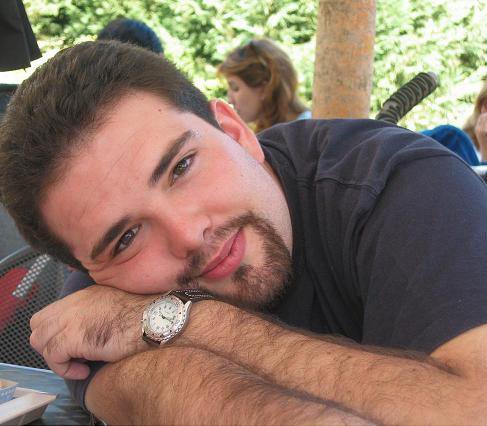Angel, parte IV
 Angel vs. Angelus
Angel vs. AngelusWhilst Liam is human and Angelus is a vampire, Angel is a third, unique persona, a demon burdened with a human soul. A hybrid of man and vampire, he constantly deals with vampiric urges, and the human conscience that prevents him from ever forgetting his past misdeeds. Though the early seasons of Buffy expressed the view that when a human becomes a vampire "You die, and a demon sets up shop in your old home; it walks like you and it talks like you - but it's not you" ("Lie to Me"), later seasons of Buffy and Angel had the relationship between Angelus and Angel far more intertwined. Angelus frequently referred to himself as "Angel" during Seasons 1 and 2 of Buffy (possibly to torment Buffy). It would seem that even before he was ensouled, "Angel" was something of an 'affectionate' nickname that Angelus was known by (or indeed a mere translation; before being cursed he had traveled in many countries and it is likely that he was generally known by the equivalent of Angel in the local language). Similarly, Angel had almost always said "I" when speaking of Angelus; they clearly share the same memories, and it is noteworthy that he never resumed the name of his human original, Liam (except while amnesiac in "Spin the Bottle"). Also it must be remembered that, in Season 1's "Eternity", Angel reverts back to his evil self without even losing his soul. This suggests that in a subconscious state that Angel's true nature is allowed to appear. Spike's character arc implied that a soul was not the "person", but rather just that person's humanity and conscience; suggesting that Angel and Angelus are not different beings, but rather the opposing id and ego of the same person. Angel hints at this when he tells Buffy that it's not the demon in him who is responsible for his acts. Darla also states that Angelus' evil was innate, suggesting that Liam initially had a far greater potential for darkness than was first apparent.
Angel: Look, I'm weak. I've never been anything else. It's not the demon in me that needs killing, Buffy. It's the man. (Episode 3.10 (Buffy) "Amends")
Angel: ...there is no guilt, there is no torment, no consequences... It's pure. I remember what that was like. Sometimes I miss that clarity.
Cordelia: But not the trying to kill your friends and family part, right? Just checking! (Episode 1.21 "Blind Date")
Cordelia: What I remember when I was a higher being... I remember seeing you. Your past. When you were Angelus.
Angel: I've never tried to hide who I was. Or what I've done. You already knew.
Cordelia: Knowing's different than living it. When I was up there, I could look back and see everyting you did as Angelus. More than see. I felt it. Not just their fear and pain. I felt you. And how much you enjoyed making them suffer... (Episode 4.07 "Apocalypse, Nowish")
In the context of the primary theme of the Angel series, redemption, this makes the most sense, which is possibly the reason for the writers returning to the "blurred" relationship between Angel/Angelus in Angel Season Five. It would also explain Angel's occasional lapses into darkness while still retaining Angel's brooding nature instead of reverting to Angelus' sadism, notably in Season 2 where he condones the massacre of Wolfram & Hart employees at the hands of Darla and Drusilla, and Season 3 where he attempts to smother Wesley Wyndam-Pryce with a pillow for abducting his son. Angelus's strength and cunning make him exceptionally lethal. Angel and Angelus can be considered as different sides of the same person - rather than thinking of one as "the Demon" and the other as "the Soul". When ensouled, the ego that has come to be known as "Angel" is dominant; without his soul, he reverts to his id, the "Angelus" persona. Both personas are controlled by his own thoughts, emotions, and actions, however, making him just as responsible for what Angelus does as he is for his actions as Angel. This is also supported by the fact that both personas do battle for Angel's mind before his soul can be restored in "Orpheus". An alternative view is that they are indeed separate beings but, having a single shared memory, have strong feelings of having been the other at the times when the other was dominant. Although Angelus' bodycount was vast, his capacity for psychological intimidation was substantially above contemporary real-life serial killers. During his time with Darla, he committed some of the most atrocious and despicably evil acts of his time. He is prone to brutal displays of what he would see as affection, one such incident involved him nailing a puppy to a wall, though a full explanation of this was never given as Buffy interrupted Giles with "Skip it, I don't have a puppy. So skip it." Another example of Angelus' brutal acts was when he brought Dru a still warm human heart on Valentine's Day. Angelus' mean streak does not stop there. He always had an obsession with death being an art form; every kill a work of art to be savored and appreciated. When he captured Giles for torture in "Becoming, Part Two (Buffy episode)", he mentions in passing that the last time he tortured someone, they hadn't even invented the chainsaw. In the episode "Amends", The First Evil references him killing a man's three children then propping them up in bed so that they appeared to be sleeping. It was only after the father kissed one of them good night that he felt how cold they were. This is similar to when Angelus placed the recently killed body of Jenny at Giles' apartment, making Giles believe she had set up a romantic evening for them. Angelus also had a weakness in that he was prone to excessive talking, and had a need to attempt psychological destruction of his victims before physically killing them. This streak of sadism sometimes gave potential victims time to either possibly escape or attempt to fight back (although it made little difference as he almost always got them in the end). Spike once observed to Angel "you bloody well talk them to death before you kill them!"


2 Pensamientos:
Esta vez no me voy a molestar en traducir lo que pone...me gusta como es el vampiro protagonísta de la historia...y al que no le guste...lo siento por él...y por la campaña que intenta hacer...no vá a cambiar mi opinión que tengo al respecto.
Besos Easy.
Que no se diga que no lo intenté :-)
Me parece fascinante el tema de la bestia interior, porque no deja de ser una personificación de un problema humano real, la lucha entre el instinto (a menudo egoísta, pero poderoso) y la conciencia (que, sin embargo, no deja de ser una limitación autoimpuesta)
Publicar un comentario
<< Home